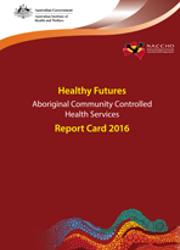Healthy Futures—Aboriginal Community Controlled Health Services Report Card 2016
Citation
AIHW
Australian Institute of Health and Welfare (2016) Healthy Futures—Aboriginal Community Controlled Health Services Report Card 2016, AIHW, Australian Government, accessed 26 April 2024.
APA
Australian Institute of Health and Welfare. (2016). Healthy Futures—Aboriginal Community Controlled Health Services Report Card 2016. Canberra: AIHW.
MLA
Australian Institute of Health and Welfare. Healthy Futures—Aboriginal Community Controlled Health Services Report Card 2016. AIHW, 2016.
Vancouver
Australian Institute of Health and Welfare. Healthy Futures—Aboriginal Community Controlled Health Services Report Card 2016. Canberra: AIHW; 2016.
Harvard
Australian Institute of Health and Welfare 2016, Healthy Futures—Aboriginal Community Controlled Health Services Report Card 2016, AIHW, Canberra.
PDF | 7.8Mb
This report card provides information from about 140 Aboriginal Community Controlled Health Services (ACCHS) providing care to Aboriginal and Torres Strait Islander Australians. During 2014–15 these services saw about 275,000 Indigenous clients who received almost 2.5 million episodes of care. About 228,700 Indigenous Australians were regular clients of ACCHSs, where they received maternal and child health services, chronic disease risk factor prevention, and management services. This report card shows rises in the proportion of clients receiving appropriate processes of care for 10 of the 16 relevant indicators.
- ISBN: 978-1-76054-043-2
- Cat. no: IHW 171
- Pages: 90
-
This report card provides information on the health services provided by ACCHS from OSR and nKPIs data collections
-
Between 2012–13 and 2014–15, the number of total clients receiving care at ACCHS increased from 316,269 to 340,299
-
Number of Indigenous clients seen at ACCHS rose from 252,038 to 274,848 between 2012–13 and 2014–15
-
The proportion of babies whose birthweight was recorded at ACCHS increased from 48% to 63% between December 2012 & 2014



